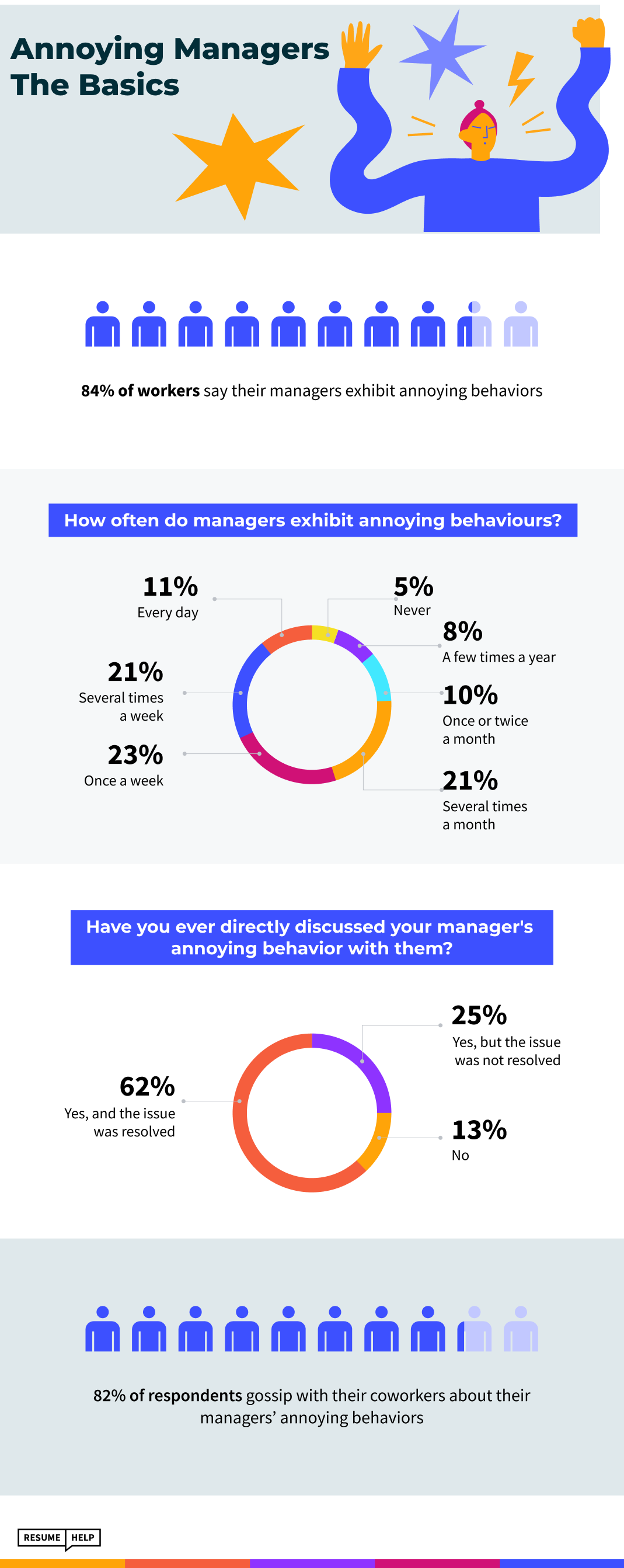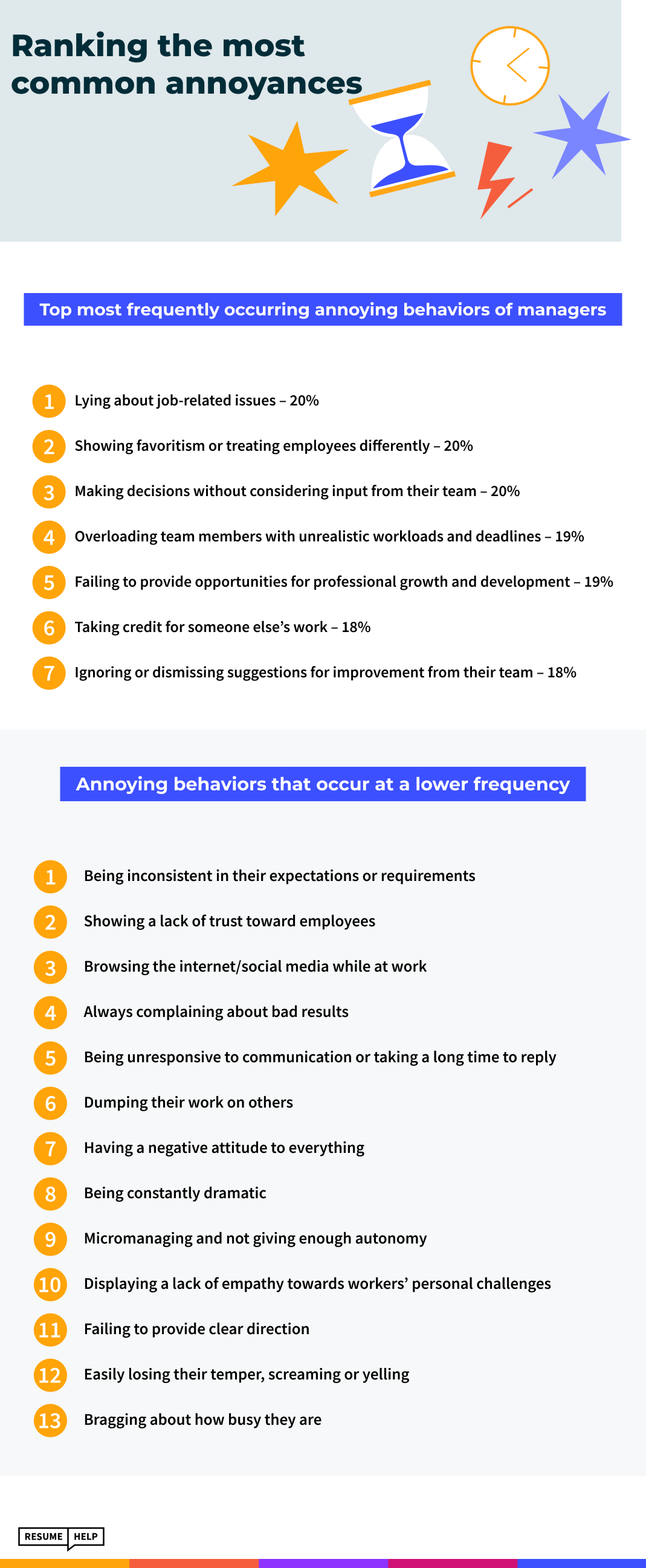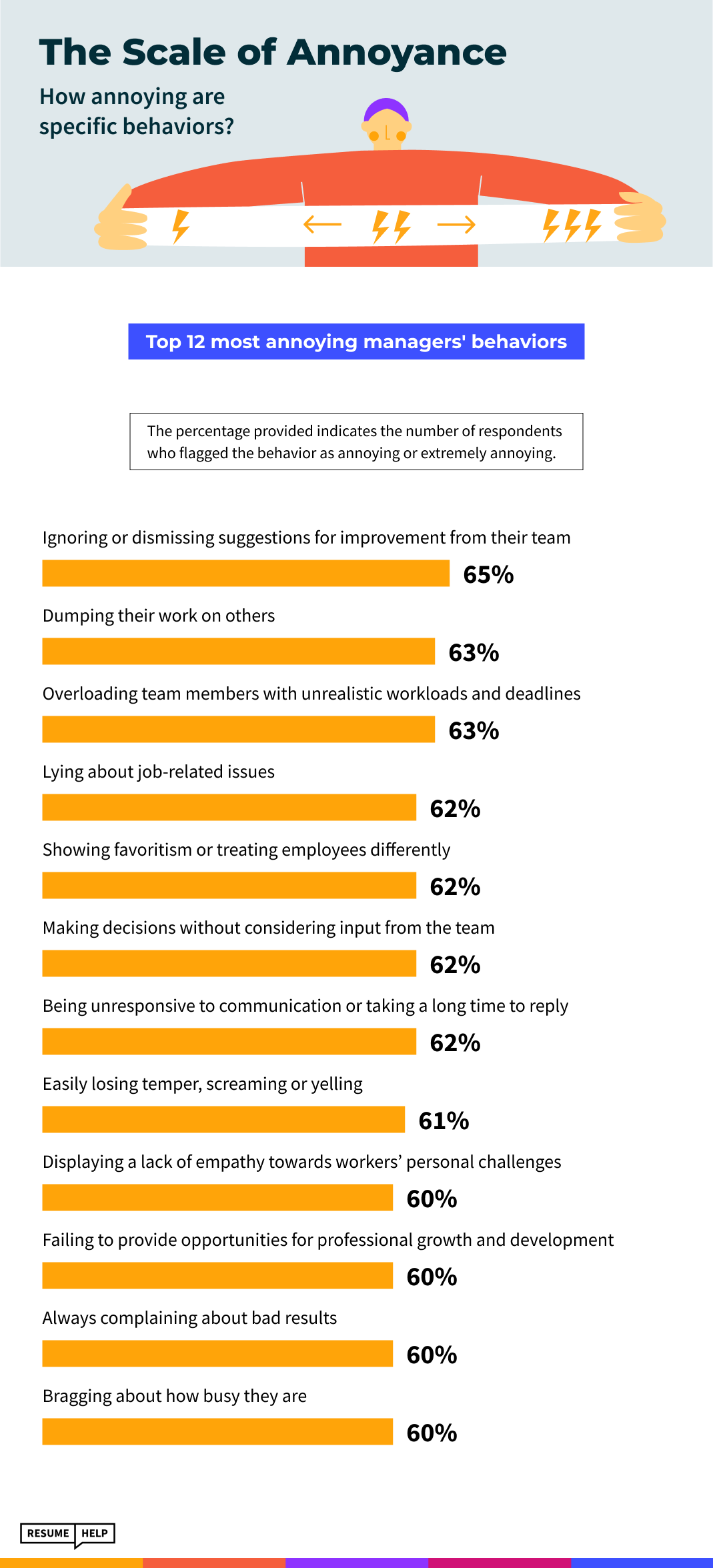Our customers have been hired by:*Foot Note

Manipulative micromanagement tendencies?
Blatant favoritism?
Being drama queens or kings?
Amidst their responsibilities and leadership aspirations, managers are not immune to displaying behaviors that employees hate.
ResumeHelp conducted a comprehensive survey of 1,500 employees who’ve had the misfortune of working with terrible boss behaviors. We explored:
- How common are annoying managers?
- What are the most common annoying behaviors?
- What behaviors are considered the most annoying?
- How do managers’ annoying behaviors impact the working environment?
What we uncovered will annoy the hell out of you.
- 84% of workers say their managers exhibit annoying behaviors.
- 82% of respondents and their coworkers gossip about their managers’ annoying behaviors.
- 82% of respondents reported a negative impact on team morale due to their manager’s annoying behaviors.
- 74% of respondents considered leaving their team or company due to their manager’s annoying behaviors.
- The top 3 most annoying behaviors are ignoring or dismissing team members’ suggestions for improvement, dumping their work on others, and overloading team members with unrealistic workloads and deadlines.
Drawing on candid insights from the workforce trenches, we highlight the habits and quirks that can sometimes leave employees scratching their heads. We also explore how these behaviors impact team morale, productivity, and employee-manager relationships.
So, let’s journey into the realm of maddening workplace behaviors that even the best managers might unwittingly exhibit.
Annoying Managers: The Basics
Thought you were the only one with an infuriating manager. Actually, you’re not alone. Managers are an endless source of pet peeves.
84% of respondents say their managers exhibit annoying behaviors.
Who has the most annoying managers?
- Education: People with a master’s degree or doctorate, 90% vs. those with a bachelor’s or associate degree, 80%.
- Sector: People working in Education, 93% vs. those in Software/IT, 76%.
And annoying habits happen a lot.
- 11% experience managers’ annoying behaviors every day.
- 21% several times a week.
- 23% encounter annoying behavior once a week.
- For 21%, it’s several times a month.
- For 10%, it’s once or twice a month.
- 8% deal with annoying behaviors a few times a year.
- 5% of respondents say their managers never annoy them.
With more than half of respondents experiencing irritating behavior from their boss at least once a week, we have a serious problem on our hands. So do workers ever raise their grievances with their bosses.
When asked if they’ve ever directly discussed the issue with their managers, 87% said yes, including:
- 62% who talked to their manager about their behavior and got the issue resolved.
- 25% who also undertook such a conversation but didn’t resolve the issue.
Additionally, 13% have never directly discussed their manager’s actions with them.
But how does it feel to discuss managers’ annoying behavior?
- 52% said that they felt somewhat comfortable or very comfortable.
- For 28%, it was a neutral experience.
But people aren’t just talking to their managers, they’re also talking about them.
82% of respondents gossip about their managers’ annoying behaviors with their coworkers.
- Gender: Women gossip more than men, 85% vs. 79%.
- Sector: Business and finance sector workers gossip more than Software/IT workers, 89% vs. 74%.
- Education: People with master’s degrees or doctorates gossip more than workers with no degree, 88% vs. 76%.
Now for the details, what are the most common things managers do to annoy us?
Build my resumeTop most annoying managers’ behaviors
In management, certain behaviors test workers’ patience and resilience to the limit.
The most frequently occurring annoying behaviors of managers are:
- Lying about job-related issues – 20%
- Showing favoritism or treating employees differently – 20%
- Making decisions without considering input from their team – 20%
- Overloading team members with unrealistic workloads and deadlines – 19%
- Failing to provide opportunities for professional growth and development – 19%
- Taking credit for someone else’s work – 18%
- Ignoring or dismissing suggestions for improvement from their team – 18%
But that’s not all, respondents also cited:
- Being inconsistent in their expectations or requirements
- Showing a lack of trust toward employees
- Browsing the internet/social media while at work
- Always complaining about bad results
- Being unresponsive to communication or taking a long time to reply
- Dumping their work on others
- Having a negative attitude to everything
- Being constantly dramatic
- Micromanaging and not giving enough autonomy
- Displaying a lack of empathy towards workers’ personal challenges
- Failing to provide clear direction
- Easily losing their temper, screaming or yelling
- Bragging about how busy they are
But not all annoying behaviors annoy to the same degree.
The scale of annoyance
Not all annoying behaviors are created equal.
We know they’re annoying, but the real question is – How annoying?
Here are the top 12 most annoying managers’ behaviors.
- Ignoring or dismissing suggestions for improvement from their team – 65%
- Dumping their work on others – 63%
- Overloading team members with unrealistic workloads and deadlines – 63%
- Lying about job-related issues – 62%
- Showing favoritism or treating employees differently – 62%
- Making decisions without considering input from the team – 62%
- Being unresponsive to communication or taking a long time to reply – 62%
- Easily losing temper, screaming or yelling – 61%
- Displaying a lack of empathy towards workers’ personal challenges – 60%
- Failing to provide opportunities for professional growth and development – 60%
- Always complaining about bad results – 60%
- Bragging about how busy they are – 60%
Respondents also listed:
- Failing to provide clear direction – 59%
- Micromanaging and not giving enough autonomy – 59%
- Being inconsistent in their expectations or requirements – 59%
- Showing a lack of trust toward employees – 58%
- Browsing the internet/social media while at work – 58%
- Having a negative attitude to everything – 57%
- Taking credit for someone else’s work – 56%
- Being constantly dramatic – 51%
These behaviors disrupt the harmony within teams. They’re not just isolated irritations but are indicative of broader problems in management. Recognizing and addressing these issues can pave the way for more cohesive teams and effective, constructive leadership.
Furthermore, the scale of annoyance can vary between different demographics.
Who is not okay with what
Below you will find how different demographics feel about annoying manager behaviors.
Ignoring or dismissing suggestions for improvement from their team
- Gender: Male, 62% vs. female, 67%
- Sector: Manufacturing, 51% vs. Food and beverage, 74%
- Company size: 201–500 employees, 79% vs. 11–50 employees, 61%
Dumping their work on others
- Gender: Male, 61% vs. female, 65%
- Sector: Education, 49% vs. Food and beverage, 70%
- Company size: 201–500 employees, 72% vs. 11–50 employees, 61%
Overloading team members with unrealistic workloads and deadlines
- Gender: Male, 61% vs. female, 64%
- Sector: Software/IT, 67% vs. education, 55%
- Company size: 201–500 employees, 74% vs. 1–10 employees, 54%
Lying about job-related issues
- Gender: Male, 60% vs. female, 63%
- Sector: Healthcare, 64% vs. Education, 51%
- Company size: $25,000–49,999, 69% vs. $75,000 and greater, 56%
Showing favoritism or treating employees differently
- Gender: Male, 60% vs. female, 63%
- Sector: Healthcare, 64% vs. Education, 51%
- Company size: 201–500 employees, 72% vs. 501+ employees, 53%
As before, the percentage indicates the number of respondents who flagged the behavior as annoying or extremely annoying.
Conclusion? No matter who you are and where you work, the chances are that one day, your manager becomes one of your office pet peeves.
Build my resumeThe price workplaces pay
Do irritating behaviors have consequences?
Yes.
82% of respondents observed a negative impact on team morale due to their manager’s annoying behaviors.
- Sector: 94% of Education sector workers agree vs. 74% of Software/IT and Healthcare.
- Age: 86% of 41 or older respondents also observed a negative impact on team morale vs. 74% of those aged 25 or younger.
- Company size: 93% of small companies workers (1-10 employees) also agree vs. 77% of corporate workers (501+ employees).
- Education: 95% of master’s or doctorate holders noticed a negative impact vs. 73% of people without college degrees.
Additionally, 74% of respondents observed a negative impact on team productivity due to their manager’s annoying behaviors.
- Sector: 84% of Education sector workers vs. 68% of Healthcare workers.
- Company size: 85% of small companies workers (1-10 employees) vs. 60% of a bit bigger businesses employees (11-50).
- Education: 78% of master’s degree or doctorate holders also noticed a negative impact on productivity vs. 64% of people without college degrees.
In 2015, Gallup reported that managers account for at least 70% of the variance in employee engagement scores across business units.
But that’s not all.
72% of respondents believe their manager’s annoying behaviors contribute to conflicts or tension within the team.
- Sector: 80% of Food and Beverage sector workers observed such a negative impact vs. 67% of Software/IT workers.
- Company size: 87% of small companies workers (1-10 employees) agree with the statement vs. 68% of a bit bigger businesses employees (11-50).
Understanding workplace dynamics involves recognizing managers’ pivotal role in shaping employees’ job satisfaction and happiness. Managers’ behavior can significantly impact the work environment.
74% of respondents considered leaving the team or company due to their manager’s annoying behaviors.
This is the case for men and women, people with or without a degree, and workers of small companies and big corporations.
- Gender: 83% of men and 85% of women have considered that option.
- Sector: 93% of Education sector workers vs. 76% of Software/IT workers.
- Education: 90% of master’s or doctorate holders vs. 80% of bachelor’s or associate degrees.
- Size of the company: 86% of workers employed in companies with 1–10, 11–50, and 201–500 workers vs. 83% of those employed in corporations with 501+ employees.
Research by SHRM in 2019 showed that 6 out of 10 respondents said that managers were the reason why they left the organization.
But there’s hope.
73% of respondents say that their leaders are proactive in improving their behaviors.
And 85% of the respondents say they generally describe their managers as good leaders.
So managers may be annoying, but they work hard to improve and are generally well-respected. With a bit more effort, these numbers could be even better.
Methodology
The findings presented were obtained by surveying 1499 respondents online via a bespoke polling tool. They were asked questions about their managers’ behaviors at work. These included yes/no questions, scale-based questions relating to levels of agreement with a statement, questions that permitted the selection of multiple options from a list of potential answers, and a question that permitted open responses. All respondents included in the study passed an attention-check question.
Limitations
The data we are presenting relies on self-reports from respondents. Everyone who took our survey read and responded to each question without any research administration or interference. We acknowledge there are many potential issues with self-reported data, like selective memory, telescoping, attribution, or exaggeration.
Sources
- Beck R., and Harter, J., “Managers Account for 70% of Variance in Employee Engagement”
- Duszynski, M., “A Boss From Hell [2020 Study]”
- Mirza, B., “Toxic Workplace Cultures Hurt Workers and Company Profits”
- Paczka, N., “Workplace Communication Pet Peeves 2024”
- Resumeble, “Get to Know 8 Common Pet Peeves of Managers So You Don’t Become One”
- Shaw, K. L., “Bosses matter: The effects of managers on workers’ performance”
- Tomaszewski, M., “List of 28 Common Office Pet Peeves [Worst of 2021—Survey]”
Fair use statement
Want to share the findings of our research? Go ahead. Feel free to use our images and information wherever you wish. Just link to this page, please—it will let other readers get deeper into the topic. Additionally, remember to use this content exclusively for non-commercial purposes.










